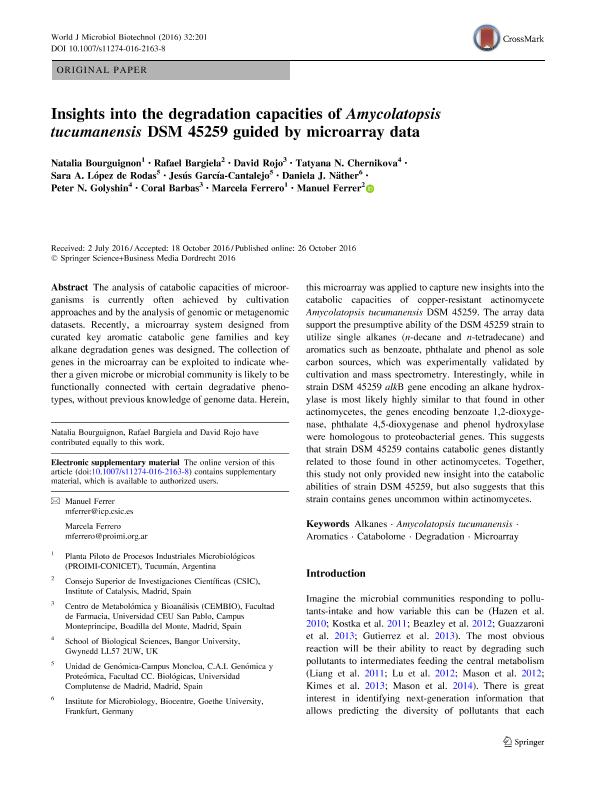Artículo
Insights into the degradation capacities of Amycolatopsis tucumanensis DSM 45259 guided by microarray data
Bourguignon, Natalia ; Bargiela, Rafael; Rojo, David; Chernikova, Tatyana N.; de Rodas, Sara A. López; García-Cantalejo, Jesús; Näther, Daniela J.; Golyshin, Peter N.; Barbas, Coral; Ferrero, Marcela Alejandra
; Bargiela, Rafael; Rojo, David; Chernikova, Tatyana N.; de Rodas, Sara A. López; García-Cantalejo, Jesús; Näther, Daniela J.; Golyshin, Peter N.; Barbas, Coral; Ferrero, Marcela Alejandra ; Ferrer, Manuel
; Ferrer, Manuel
 ; Bargiela, Rafael; Rojo, David; Chernikova, Tatyana N.; de Rodas, Sara A. López; García-Cantalejo, Jesús; Näther, Daniela J.; Golyshin, Peter N.; Barbas, Coral; Ferrero, Marcela Alejandra
; Bargiela, Rafael; Rojo, David; Chernikova, Tatyana N.; de Rodas, Sara A. López; García-Cantalejo, Jesús; Näther, Daniela J.; Golyshin, Peter N.; Barbas, Coral; Ferrero, Marcela Alejandra ; Ferrer, Manuel
; Ferrer, Manuel
Fecha de publicación:
10/2016
Editorial:
Springer
Revista:
World Journal of Microbiology
ISSN:
0959-3993
Idioma:
Inglés
Tipo de recurso:
Artículo publicado
Clasificación temática:
Resumen
The analysis of catabolic capacities of microorganisms is currently often achieved by cultivation approaches and by the analysis of genomic or metagenomic datasets. Recently, a microarray system designed from curated key aromatic catabolic gene families and key alkane degradation genes was designed. The collection of genes in the microarray can be exploited to indicate whether a given microbe or microbial community is likely to be functionally connected with certain degradative phenotypes, without previous knowledge of genome data. Herein, this microarray was applied to capture new insights into the catabolic capacities of copper-resistant actinomycete Amycolatopsis tucumanensis DSM 45259. The array data support the presumptive ability of the DSM 45259 strain to utilize single alkanes (n-decane and n-tetradecane) and aromatics such as benzoate, phthalate and phenol as sole carbon sources, which was experimentally validated by cultivation and mass spectrometry. Interestingly, while in strain DSM 45259 alkB gene encoding an alkane hydroxylase is most likely highly similar to that found in other actinomycetes, the genes encoding benzoate 1,2-dioxygenase, phthalate 4,5-dioxygenase and phenol hydroxylase were homologous to proteobacterial genes. This suggests that strain DSM 45259 contains catabolic genes distantly related to those found in other actinomycetes. Together, this study not only provided new insight into the catabolic abilities of strain DSM 45259, but also suggests that this strain contains genes uncommon within actinomycetes.
Palabras clave:
Alkanes
,
Amycolatopsis Tucumanensis
,
Aromatics
,
Catabolome
,
Degradation
,
Microarray
Archivos asociados
Licencia
Identificadores
Colecciones
Articulos(PROIMI)
Articulos de PLANTA PILOTO DE PROC.IND.MICROBIOLOGICOS (I)
Articulos de PLANTA PILOTO DE PROC.IND.MICROBIOLOGICOS (I)
Citación
Bourguignon, Natalia; Bargiela, Rafael; Rojo, David; Chernikova, Tatyana N.; de Rodas, Sara A. López; et al.; Insights into the degradation capacities of Amycolatopsis tucumanensis DSM 45259 guided by microarray data; Springer; World Journal of Microbiology ; 32; 12; 10-2016; 1-12
Compartir
Altmétricas



